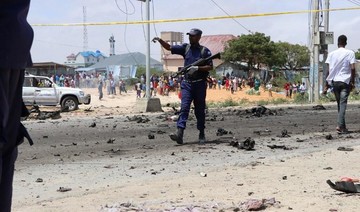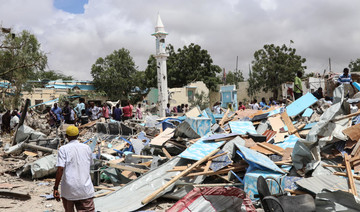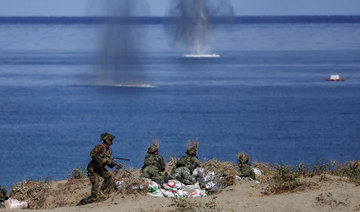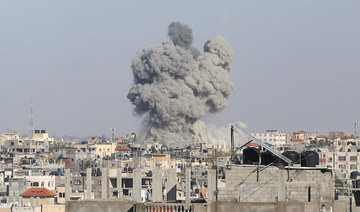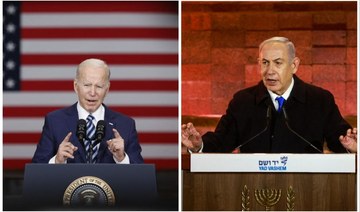NAIROBI, Kenya: Somalia on Sunday marked the first anniversary of one of the world’s deadliest attacks since 9/11, a truck bombing in the heart of Mogadishu that killed well over 500 people, while the man accused of orchestrating the blast was executed by a firing squad.
As people gathered at a new memorial with prayers and a minute of silence, the deputy prosecutor general of the Somali military court, Capt. Mumin Hussein, confirmed the execution of Hassan Aden Isaq. It was the first under the country’s Somali-American president, Mohamed Abdullahi Mohamed.
Memories of the bombing are still raw in a country that has faced decades of deadly warlord-led chaos and attacks by the Al-Qaeda-linked Al-Shabab extremist group. The Oct. 14, 2017 bombing was so devastating that Al-Shabab never claimed responsibility amid local outrage.
The new UN envoy to Somalia, Nicholas Haysom, on Sunday called it “the deadliest ever terrorist attack in Africa, and such terrorist attacks amount to a war crime.”
“In my mind, it feels like it has happened just yesterday,” said Sadiya Mohamed, a 49-year-old who lost her eldest son. He is among hundreds of people still missing. “I can barely get sleep since that dark day. He was everything for us,” she said.
Somalia’s government declared Oct. 14 as a national day to remember victims of all “terrorist” bombings across the Horn of Africa nation.
On Sunday, the fatigues-wearing president traveled to the coastal town of Marka to mark the anniversary with a military brigade formed by young men who volunteered for service after last year’s attack, presidential spokesman Abdinur Mohamed told The Associated Press. The brigade is named after the bombing.
Somalis now look to the future with a mixture of sorrow and hope.
Many believe the global attention to the attack and outpouring of grief should bring much-needed assistance for the fragile central government and security forces, who in the next few years are expected to take over the country’s security from African Union peacekeepers.
“That was a big test for the international community’s seriousness in helping Somalia to move forward,” said Ahmed Mohamed, a former lawmaker.
Somali officials have said they did not even have the DNA testing tools to help identify the dead, and accused the US and Britain of not responding to appeals ahead of the attack for further technical assistance and intelligence-sharing.
The United States, which has targeted Al-Shabab with dozens of airstrikes and increased its military presence in Somalia since early 2017 to about 500 personnel, on Sunday recalled the “sickening attack” and said the US would continue to collaborate to “overcome terrorism and promote stability and prosperity.”
For many of the victims’ loved ones, the day was simply one to grieve.
“Imagine living with the reality of not having your father dead or alive,” said Mohamed Sheikh, a 17-year-old rickshaw driver whose father is among the missing. “That memory keeps haunting me each day and night.”
The bombing shattered one of Mogadishu’s busiest business districts. Reconstruction has begun but many buildings in the area still lay in ruins.
Most of those killed were civilians going about their daily lives when the truck that had been trying to force its way through heavy traffic exploded.
Security officials have said they had advance warning about an incoming vehicle but had no idea about the large amount of explosives it carried.
“We had been trailing the car bomb before it was detonated but he sped through a traffic jam and unfortunately reached the site,” said Abdullahi Sanbalolshe, Somalia’s former intelligence chief.
Amid the shock of the blast, hospitals and officials pleaded for Mogadishu residents to donate blood. Many pushed cultural hesitations aside and got in line.
Some survivors say the attack changed their lives forever.
“I regained consciousness and found myself on a hospital bed with serious burns on nearly all of my body,” said Yusuf Ahmed, a shopkeeper who lost his wife in the blast.
The 35-year-old father of four now raises their young children. “She was the light and the only helper of my life,” he said. “My life changed for the worst since I lost her.”
Somalia marks 1 year since devastating Mogadishu bombing
Somalia marks 1 year since devastating Mogadishu bombing
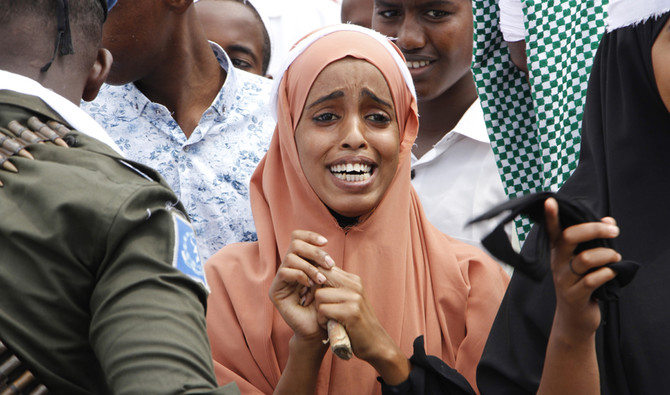
- People gathered at a new memorial with prayers and a minute of silence
- The attack was the deadliest ever terrorist act in Africa
Taiwan must invest in building its own ‘strengths,’ vice president-elect says
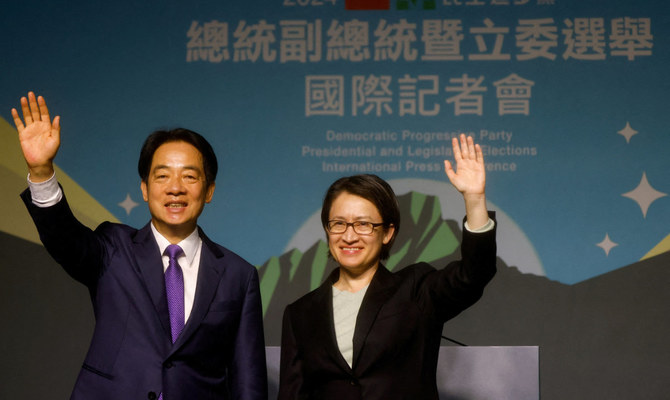
- The United States is Chinese-claimed Taiwan’s most important supporter and arms supplier, despite the lack of diplomatic ties
TAIPEI: Taiwan is grateful for continued US security assistance but must invest in building its own “strengths” first and show the world its support for the island is worth it, Vice President-elect Hsiao Bi-khim said on Monday.
Hsiao, who takes office with President-elect Lai Ching-te on May 20, is Taiwan’s former de facto ambassador to Washington, and is expected to play a key role in further strengthening ties with the United States given her fluent English and deep ties in the US capital.
The United States is Chinese-claimed Taiwan’s most important supporter and arms supplier, despite the lack of diplomatic ties.
Speaking to a think-tank forum, Hsiao expressed appreciation for US President Joe Biden last month signing into law legislation to boost Taiwan’s defenses, part of a broader package of assistance for Ukraine and Israel.
“This bill demonstrates the US’ continuing commitment to supporting allies and partners in the face of geopolitical challenges,” she said.
“But beyond thanking our international friends for their support, it is important that as Taiwanese we invest in building our own strengths first,” she said.
“Through our own efforts in building a resilient Taiwan, we must have the confidence that Taiwan is worthy of galvanizing international support.”
China has ramped up its military pressure against Taiwan over the past four years. Taiwan’s government rejects Beijing’s sovereignty claims.
Hsiao and Lai — who have pledged to continue President Tsai Ing-wen’s defense self-sufficiency and modernization program — take power just months before the US presidential election in November.
Former President Donald Trump, whose administration strongly supported Taiwan and is the presumptive Republican candidate this time round, has said US allies like European members of NATO have to spend more on defense and not just rely on the United States shouldering the burden.
Trump has also been critical of US support for Ukraine following its invasion by Russia.
Rafah invasion ‘must not go ahead’: UK Labour leader
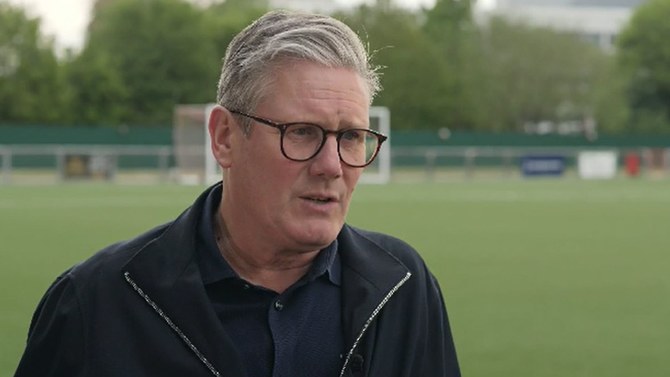
- Keir Starmer calls for ‘immediate ceasefire, release of hostages, unimpeded aid into Gaza’
- Israeli defense minister warns of ‘powerful operation in very near future’
LONDON: An Israeli offensive in the Gazan city of Rafah “must not go ahead,” the leader of the UK’s main opposition Labour Party said on Monday.
Keir Starmer’s comments came after the Israeli military told Palestinian civilians in the area to leave ahead of a planned offensive.
“With more than a million Palestinian civilians sheltering in Rafah, an Israeli offensive must not go ahead,” Starmer wrote on X.
“There must be an immediate ceasefire, the immediate release of all hostages, and unimpeded aid into Gaza that can be delivered regularly, quickly and safely.”
Israeli Defense Minister Yoav Gallant warned on Sunday of “a powerful operation in the very near future in Rafah.”
Starmer was echoed by his Shadow Foreign Secretary David Lammy, who posted on X that an invasion of Rafah “would be catastrophic.”
Shadow International Development Secretary Lisa Nandy warned that people trapped in Rafah “have nowhere else to go.”
So far, at least 34,700 Palestinians have been killed in Gaza since the start of the war last October.
India BJP’s election videos targeting Muslims and opposition spark outrage
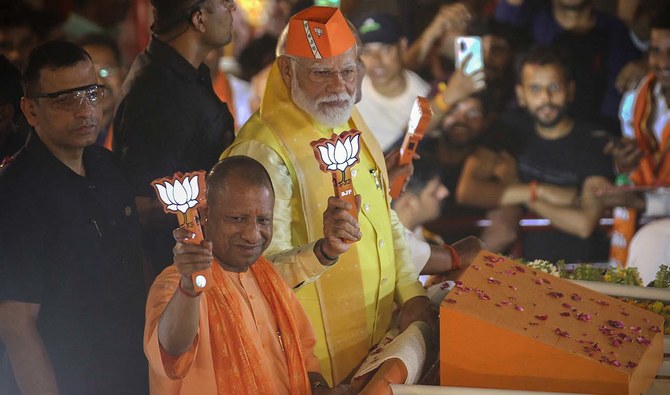
- Videos shared by BJP depict Congress giving disproportionate benefits to Muslims over tribal and Hindu groups
- Manipulated videos have become contentious issue in polls, such as fake videos of top Bollywood stars criticizing Modi
NEW DELHI, May 6 : Animated videos shared by Prime Minister Narendra Modi’s party targeting opposition Congress and the Muslim community have evoked complaints and outrage, as the political climate in India heats up midway through its six-week long election.
The videos, shared by the ruling Bharatiya Janata Party on social media platforms Instagram and X over the last ten days, depict the Congress giving disproportionate benefits to India’s minority Muslim community, at the cost of certain disadvantaged tribal and Hindu caste groups.
The Congress, in a complaint to the poll watchdog Election Commission, said on Sunday that the video has been shared “clearly with an intention to wantonly provocate rioting and promote enmity between different religions.”
A set of guidelines mutually adopted by political parties for how they should conduct themselves during the election period prohibit them from creating “mutual hatred” between caste, religious or linguistic groups.
Manipulated videos on social media have also become a contentious issue in this election, such as fake videos showing top Bollywood stars criticizing the prime minister.
On Monday, the commission warned parties against the misuse of AI tools to create deep fakes and told them not to publish and circulate such videos. It also said parties had been directed to remove such content within three hours of it being brought to their notice.
Modi, the face of the Hindu-nationalist BJP, seeking a rare third consecutive term, had focused his campaign largely on his government’s performance on economic growth and welfare benefits.
But he changed tack after the first phase of voting on April 19 and his campaign speeches have since become more polarizing on religious lines, accusing Congress of planning to redistribute the wealth of the majority Hindus among minority Muslims, who he called “infiltrators” who have “more children.”
The videos shared by the BJP over the last ten days, one of which has since been taken down, illustrated the same message.
A 17-second video shared by a state unit of BJP on May 4, with over 8.5 million views, shows a character resembling Congress leader Rahul Gandhi feeding “funds” to a bird in a skullcap, which eventually pushes out from their common nest three other birds representing other disadvantaged groups.
The Congress has filed a police complaint against BJP leaders for the video, BJP’s head of information and technology Amit Malviya said on X.
“The Congress should in fact thank the BJP for taking their manifesto to the people in a manner that even they couldn’t,” he wrote.
The video has elicited outrage. Nitasha Kaul, a politics professor at London’s Westminster University said on X that the video was a “straightforward 1930s Germany style cartoon.”
In its manifesto for the elections, the Congress has promised to tackle India’s economic inequality by conducting a socio-economic caste census and extending affirmative action. It said it will ensure that minorities receive “their fair share” of education, economic and health care opportunities.
An Election Commission spokesperson, the BJP’s Malviya and Congress spokespersons did not respond to requests seeking comment.
Bangladeshi students rally in solidarity with global student movement against Israel
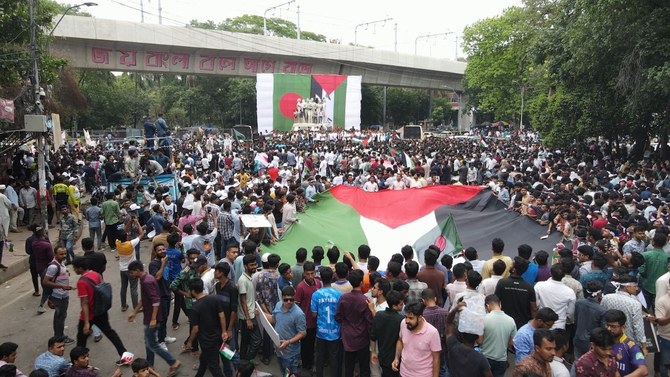
- US student protests have sparked more around the world, including in India, France, Australia
- Dhaka’s thousands-strong rally took place at Bangladesh’s largest, oldest tertiary institution
DHAKA: Thousands of people protesting Israel’s war on Gaza rallied at one of Bangladesh’s top universities on Monday in solidarity with the student-led protests and occupations sweeping the globe.
Pro-Palestinian student leaders and activists from different universities marched and carried flags of Bangladesh and Palestine, chanting slogans in solidarity with Gaza as they made their way to Dhaka University, Bangladesh’s largest and oldest tertiary institution.
Their protest culminated at the symbolic Aparajeyo Bangla sculpture, one of the most well-known landmarks dedicated to the Bangladesh Liberation War of 1971.
“Our stance is very clear: We express solidarity in support of a free Palestine state, in favor of a world free from war. And we support the demands made by US students, like divestment from Israel and other organizations that support the Israeli aggression,” Saddam Hussain, president of the organizing student group Bangladesh Students’ League, told Arab News.
They are also rallying in solidarity with the global student movement, he added.
“We believe all protests hold the same spirit of the youth, be it on the banks of the Atlantic or here on the bank of River Padma,” he said.
“The youths around the world have a common dream, and I urge all of them to move forward to make this dream come true. I hope all the youths of the world will join in this protest to build a world free from war, free and guided with humanitarian spirit.”
The Israeli strikes on Gaza that began in October have killed nearly 35,000 people in the Palestinian territory, mostly women and children. The leader of the World Food Program said over the weekend that parts of the Gaza strip were experiencing a “full-blown famine” that was spreading across the besieged enclave.
Students started to rally or set up tents at various universities around the US last month to protest Israel’s war on Gaza, sparking a global solidarity movement among the youth in India, Australia, France and elsewhere, with many putting pressure on their administrators and governments to cut ties with Tel Aviv.
While US colleges have seen protests since October, the unrest has escalated in recent weeks after police arrested pro-Palestine demonstrators at an encampment in Columbia University, sparking even more campsites at other campuses, as well as more crackdowns and arrests.
Unlike in the US, students in Dhaka were able to protest peacefully with scant police presence.
“The US and some other big players always speak in favor of freedom of speech. But what we have seen in the university campuses in the US is a shame for world leaders,” Solaiman Khan, a 23-year-old Dhaka University student, told Arab News.
“It’s a double standard. We, the youth (of Bangladesh), came out to the streets against this sort of hypocrisy from the superpowers of the world.”
Khan said the violence against Palestinians must be “stopped now and forever.”
“We have seen enough atrocities done by the Israeli forces. How many more lives must the world lose? Is it not enough?” he said.
“I think world leaders should come to their senses and act more rationally in stopping the atrocities in Gaza orchestrated by the occupying Israeli forces. Now is the time to play a decisive role. Otherwise, the next generation will not forgive us.”
Pro-Palestine Oxbridge students set up encampments

- They are demanding transparency about the universities’ financial links to Israel
- ‘We will not move until our demands are met’
LONDON: Students at the universities of Oxford and Cambridge have set up encampments in support of Palestine, The Times reported on Monday.
Around 50 have refused to leave the lawn of King’s College, Cambridge, while students have also declared a “liberated zone” outside Oxford’s Pitt Rivers Museum.
A banner hung outside King’s College read: “Welcome to the people’s university for Palestine.” Chants of “stop the bombing now” have also been heard on the campus.
The protests have been organized by Oxford Action for Palestine and Cambridge for Palestine.
They are demanding transparency about the universities’ financial links to Israel, which they have described as a “settler colonial state,” and are calling for the end of all investments and endowments from Israeli and Israel-linked companies.
“We have set up camp in university grounds, and we will not move until our demands are met,” the groups said in a statement, adding that the universities are legitimate targets for protests because of their “role in the British empire and its disastrous colonial legacies.”
The Times reported that protesters had been given an itinerary for their involvement including “de-escalation training” and “banner-making.”
A spokesperson for Cambridge University said it is for the college to decide whether to call the police, adding: “The university is fully committed to academic freedom and freedom of speech within the law and we acknowledge the right to protest.
“We ask everyone in our community to treat each other with understanding and empathy. Our priority is the safety of all staff and students.
“We will not tolerate antisemitism, Islamophobia and any other form of racial or religious hatred, or other unlawful activity.”
The relatively small UK protests come after nearly 2,000 people were arrested across the US after widespread demonstrations on over 130 American university campuses about Israel’s ongoing war in Gaza.


